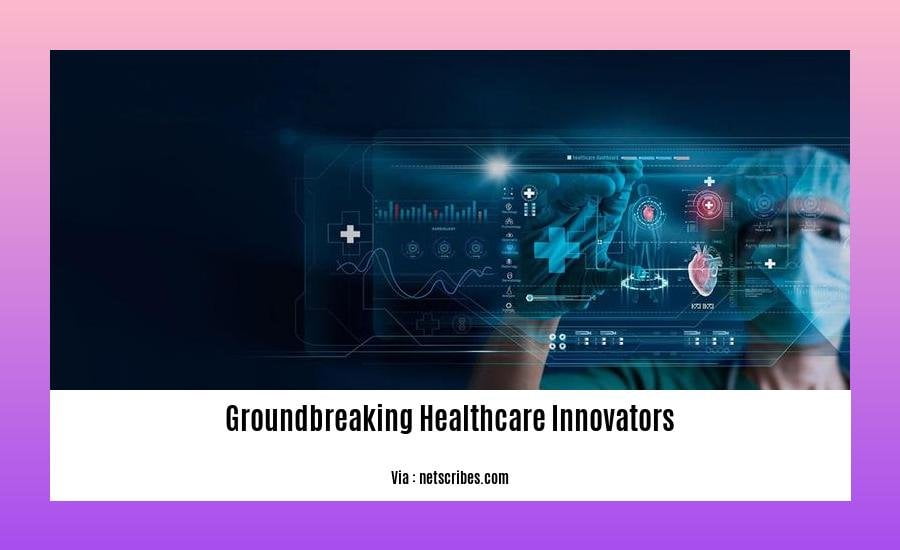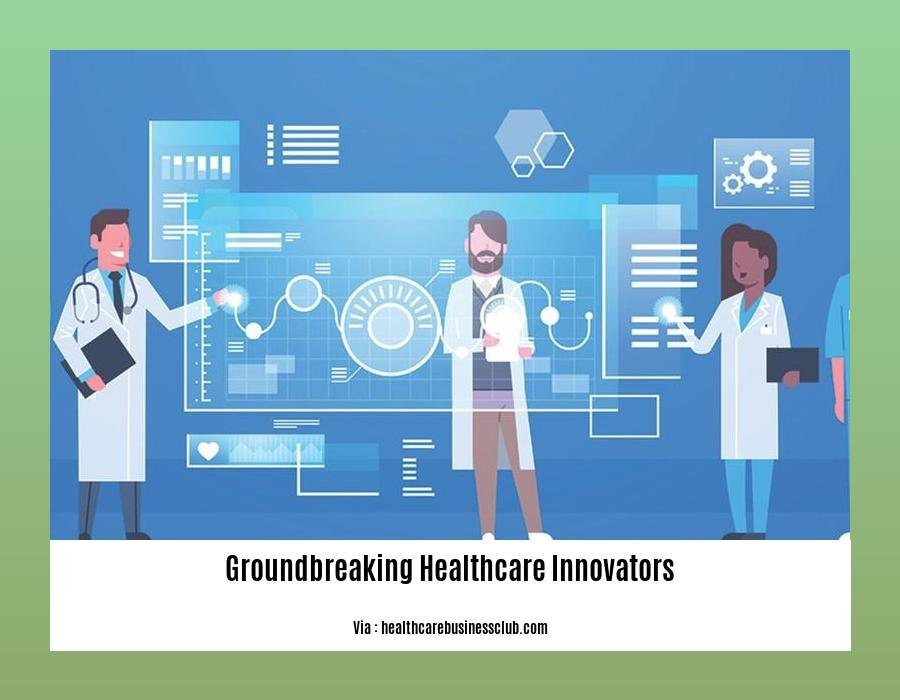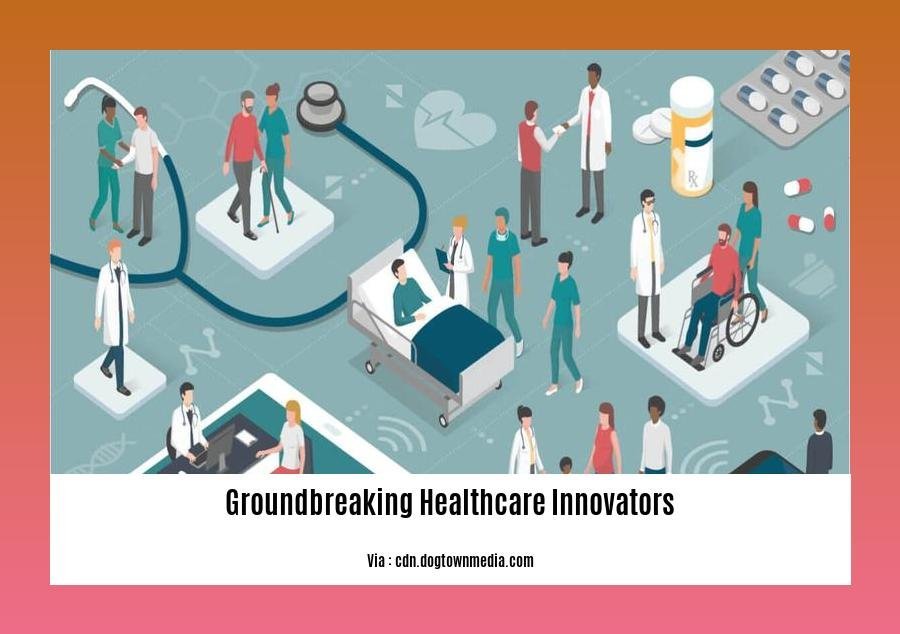Prepare to be inspired as we delve into the world of Groundbreaking Healthcare Innovators: The Future of Medicine. Join us on a journey to meet the brilliant minds and uncover the transformative technologies that are redefining the healthcare landscape. From AI-powered diagnostics to personalized treatments, we’ll explore the cutting-edge advancements shaping the future of medicine and the healthcare industry at large.
Key Takeaways:

- AI empowers disease detection, diagnosis, and treatment.
- 3D printing enables custom prosthetics and drug delivery devices.
- CRISPR gene editing treats genetic diseases.
- VR revolutionizes training, surgery simulations, and rehabilitation.
- Smart bandages enhance wound healing and infection control.
Groundbreaking Healthcare Innovators
Artificial intelligence, 3D printing, CRISPR gene editing, virtual reality, and smart bandages – these are just a few of the groundbreaking innovations transforming the face of healthcare today.
In a world where the boundaries of medicine are constantly being pushed, groundbreaking healthcare innovators are emerging with disruptive technologies that have the potential to revolutionize patient care. From the development of personalized treatments to the creation of new medical devices, these innovators are playing a vital role in shaping the future of healthcare.
Artificial Intelligence (AI) has emerged as a powerful tool in healthcare. Machine learning algorithms enhance disease detection, diagnosis, and treatment, empowering doctors with critical insights into patient data. AI-powered systems can analyze vast amounts of medical records, identify patterns, and make predictions that assist in diagnosis and treatment planning.
3D printing is another disruptive technology revolutionizing healthcare. Custom prosthetics, tissue engineering, and drug delivery devices are just a few of the applications of 3D printing in healthcare. By creating patient-specific implants and devices, 3D printing enables personalized treatments that improve patient outcomes.
CRISPR gene editing has emerged as a promising frontier in the treatment of genetic diseases. It allows for the precise modification of DNA, offering the potential to correct genetic defects and treat diseases like sickle cell anemia and cystic fibrosis.
Virtual reality (VR) is transforming the healthcare landscape, offering new possibilities for training, surgery simulations, and patient rehabilitation. VR-based training programs provide immersive experiences, enhancing the skills of surgeons and healthcare professionals.
Smart bandages are another innovative technology that promises to improve wound care. These bandages are equipped with sensors that monitor wound conditions and deliver medication, promoting healing and preventing infections.
Examples of Groundbreaking Healthcare Innovators
- Verily Life Sciences: Developing AI-powered tools for disease detection and personalized treatments.
- Carbon: Revolutionizing 3D printing technology for custom prosthetics and medical devices.
- Intellia Therapeutics: Advancing CRISPR gene editing therapies for genetic diseases.
- Osso VR: Providing VR-based surgical training programs for medical students and residents.
- Xenoma: Developing smart bandages that monitor and treat wounds, improving healing outcomes.
The impact of groundbreaking healthcare innovators extends beyond the development of new technologies to the reimagination of healthcare delivery models. These innovators are fostering collaboration between disciplines, promoting data sharing, and advocating for patient-centered care.
As groundbreaking healthcare innovators continue to push the boundaries of medicine, we move closer to a future where personalized, accessible, and effective healthcare becomes a reality for all.
Discover the groundbreaking innovators and pioneers in the medical field who revolutionized healthcare, and uncover the inspiring stories of the medical pioneers whose breakthroughs saved lives. Explore the landmark pioneers in medicine and treatment who made significant contributions to our understanding of health and disease.
Startups Revolutionizing the Healthcare Ecosystem
Key Takeaways:
- Startups are driving innovation in healthcare, from AI-powered disease detection to personalized medicine.
- Digital health technologies empower patients with remote monitoring and virtual care options.
- Advancements in gene editing and AI are opening new possibilities for treating complex diseases.
Body:
The healthcare industry is undergoing a profound transformation, thanks in large part to the surge of startups introducing groundbreaking technologies and solutions. These startups are playing a pivotal role in revolutionizing patient care, improving accessibility, and reducing costs.
One of the most exciting areas of innovation is generative AI and personalized medicine. AI algorithms are transforming disease detection, enabling earlier and more accurate diagnosis. They can analyze vast amounts of data, including patient history, genetic information, and medical images, to identify subtle patterns and anomalies that may escape the human eye. This leads to more personalized treatment plans tailored to each patient’s unique needs.
IoT-powered virtual healthcare is another game-changer. Remote monitoring devices and wearable sensors empower patients to track their health and transmit data to healthcare providers in real-time. This enables proactive care, allowing doctors to identify potential health issues early on and intervene before they become more serious.
Digital health technologies are also empowering patients with greater control over their health. Patient portals provide easy access to medical records, allowing patients to view test results, book appointments, and communicate with their providers. Virtual consultations enable patients in remote areas or with mobility issues to receive quality care from the comfort of their homes.
Advancements in gene editing and AI hold immense promise for treating complex diseases. CRISPR-Cas, a gene-editing tool, allows scientists to target and modify specific DNA sequences. This technology has the potential to treat genetic disorders, correct mutations, and even cure currently incurable diseases. AI is also playing a crucial role in drug discovery and development, accelerating the process and reducing costs.
Despite the funding constraints often faced by digital health startups, their impact on the healthcare industry is undeniable. As these startups continue to innovate and develop next-generation solutions, the future of healthcare looks brighter than ever.
Citation:
Collaboration and Partnerships Driving Healthcare Advancements
Key Takeaways:
- Partnerships foster innovation by combining expertise and perspectives.
- Collaboration models drive sustainable healthcare advancements.
- Strategic partnerships enhance clinical and operational processes.
- Partnerships accelerate digital transformation and meet personalized healthcare demands.
- Complementary products and services drive innovation through partnerships.
- Partnerships expedite the journey from ideas to real-world solutions.
Partnerships play a transformative role in healthcare. They bring together diverse perspectives, leverage complementary strengths, and accelerate the development of innovative solutions. Strategic collaboration is essential for driving sustainable healthcare advancements.
Collaboration models enable knowledge and resource sharing, fostering an environment where groundbreaking ideas can flourish. By pooling expertise, healthcare providers, researchers, and industry leaders can tackle complex challenges collectively, resulting in more efficient and effective solutions.
Partnerships can enhance clinical and operational processes, leveraging technology to streamline workflows and improve patient outcomes. They accelerate digital transformation, promoting the adoption of telemedicine, AI-powered diagnostics, and personalized treatment plans. These advancements empower patients with greater access to care and tailored interventions.
Furthermore, partnerships can meet the growing demand for personalized healthcare by leveraging complementary products and services. Collaboration allows organizations to offer a wider range of options, providing patients with tailored solutions that address their unique needs. By leveraging the strengths of diverse partners, healthcare providers can create a more comprehensive and patient-centric care experience.
Partnerships accelerate the journey from transformative ideas to real-world solutions. They facilitate the sharing of best practices, reduce duplication of efforts, and pool resources to bring innovative products and services to market faster. This collaboration enables healthcare innovators to bring their visions to reality and improve patient care.
[Citation: Healthcare Transformers, “Strategic Partnerships in Healthcare: Driving Innovation and Transformation”](
Personalized Medicine and Precision Diagnostics
Precision medicine is revolutionizing healthcare by enabling tailored treatments based on a patient’s genetic makeup and individual characteristics. This approach offers more precise and effective medical interventions by considering factors like lifestyle, environment, and disease progression.
Precision diagnostics, powered by advanced imaging techniques and data analytics, improves diagnosis accuracy and allows for early detection of diseases. Combined with precision medicine, these technologies drive personalized treatment plans, optimizing outcomes and minimizing unnecessary interventions.
Key Takeaways:
- Personalized medicine tailors treatments based on individual patient profiles, enhancing efficacy and reducing adverse effects.
- Precision diagnostics improve disease detection and diagnosis, facilitating timely and targeted interventions.
- By combining precision medicine and precision diagnostics, healthcare professionals can provide individualized care plans, leading to better patient outcomes.
Example:
Precision imaging in oncology can reveal tumor characteristics that guide treatment decisions. For instance, 3D imaging can accurately locate and visualize tumors, enabling personalized radiation therapy with reduced side effects.
Citation:
- Precision Diagnostics and Therapeutics: Advancing Personalized Medicine

FAQ
Q1: What are the key innovations revolutionizing healthcare?
A1: Groundbreaking innovations like AI, 3D printing, CRISPR gene editing, VR, and smart bandages are transforming healthcare by enhancing disease detection, diagnosis, and treatment.
Q2: How is AI impacting healthcare?
A2: AI algorithms and machine learning empower healthcare professionals with improved disease detection, more accurate diagnoses, and tailored treatments.
Q3: What is the potential of 3D printing in healthcare?
A3: 3D printing offers immense potential for creating custom prosthetics, engineering tissues, and manufacturing drug delivery devices, leading to personalized medical solutions.
Q4: How is CRISPR gene editing advancing healthcare?
A4: CRISPR gene editing allows precise modification of DNA, paving the way for groundbreaking treatments for genetic diseases.
Q5: What role does VR play in healthcare?
A5: VR technology enhances training, provides immersive surgery simulations, and supports patient rehabilitation, offering innovative and effective healthcare experiences.
- Unlock Water’s Symbolism: A Cross-Cultural Exploration - April 20, 2025
- Identify Black and White Snakes: Venomous or Harmless? - April 20, 2025
- Unlocking Potential: Origins High School’s NYC Story - April 20, 2025















